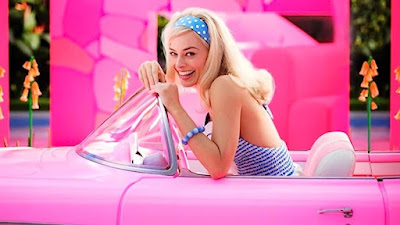ROCKY AUR RANI KI PREM KAHANI has a running time of 168 minutes plus an interval. It is rated 12A for infrequent strong language, moderate innuendo, sexual violence references.
Monday, July 31, 2023
ROCKY AUR RANI KI PREM KAHANI*****
Sunday, July 30, 2023
THE BEANIE BUBBLE***
THE BEANIE BUBBLE is rated R, has a running time of 111 minutes and is streaming on Apple TV.
Tuesday, July 25, 2023
MY NAME IS ALFRED HITCHCOCK****
Mark Cousins is arguably the most erudite cinema essayist working today and cineastes will learn a lot from watching his latest film about the works of the master, Alfred Hitchcock. With minute detail and deep knowledge of how Hitchock's films were constructed (lighting, mise en scene, framing, direction) Cousins gives us new insights into Hitchcock's art. He does this my chossing six themes - escape, desire, loneliness, time, fulfilment and height - and then taking scenes from Hitchock's work and explaining the throughline, whether from the early British black and white films or the later big budget American colour films. My only issue with Cousins' documentary - though it is a big one - is that rather than simply narrating the film himself, as Cousins' did with his epic STORY OF CINEMA, he chooses to deliver his analysis from the imagined point of view of Hitchcock himself, as voiced by the impersonator Alastair McGowan. I found this really distracting, maybe partly because Hitchcock had such a particular (and not particularly clear) way of speaking. I would far rather Cousins shed the pretense that he can see into the minds of these auteurs (he did something similar with Welles). First-rate film criticism is enough. It doesn't need any bells and whistles or imaginative leaps.
MY NAME IS ALFRED HITCHCOCK has a running time of 120 minutes. It played Telluride 2022 and is on limited release in UK cinemas and is available to rent at home.
Saturday, July 22, 2023
OPPENHEIMER*****
BARBIE***
Monday, July 17, 2023
SQUARING THE CIRCLE (THE STORY OF HIPGNOSIS)****
Pity Gen Z for many things, but especially for never knowing the joys of vinyl - the waiting in line for new releases, the reverential first play, the endless mooning over the iconic cover art, interpreting and reinterpreting now iconic images. Noel Gallagher sums it up best when he observes that his kid doesn't even know what cover art is, least of all why anyone would pay for it. Thumbnail schnumbnail. But in the old days of prog rock when drum solos could last half an hour and record companies were allowing their stadium bands unprecedented freedom, the album cover was the art of the masses (again, aptly put by Noel). And if album covers were art then Hipgnosis aka Storm Thorgerson and Aubrey "Po" Powell were the most influential artists of their time. Almost every classic cover you know from Led Zip, the Floyd, 10CC, Peter Gabriel, and more besides were designed by this duo. They seem to have fallen into the job by way of psychedelic drug-taking and happening to know Pink Floyd. It's the kind of weird whacky shit you can't make it: they amass their first lighting rig from Roman Polanski who was shooting REPULSION in the same apartment block. Drugs killed Bono and video killed Hipgnosis. There was a half-arsed attempt at becoming video artists but it broke up without record companies to under-write their (or specifically Storm's) excesses. But what a time they had.
Photographer and fiction feature director Anton Corbijn (CONTROL) tells this story in his trademark black and white, with only the album covers themselves in glorious colour. The doc is centred around a candid and deeply moving interview with Po and old footage of the design studio members at their height. We also get context and insight from new interviews with members of Floyd, Led Zeppelin and Peter Gabriel. Their respect for the art of Hipgnosis is clear. And with this doc we all get to go behind the scenes of some of their most iconic album cover shoots and relive their glory. Splendid stuff.
SQUARING THE CIRCLE (THE STORY OF HIPGNOSIS) has a running time of 101 minutes. It played Telluride 2022 and Sundance 2023 and was released in UK cinemas and streaming platforms last weekend.
ASTEROID CITY**
It feels as though Wes Anderson peaked somewhere around GRAND BUDAPEST HOTEL and has been offering diminishing returns ever since. To be sure, ASTEROID CITY isn't quite as pointless as THE FRENCH DISPATCH but it isn't far off. The film looks beautiful. It is as full of Wes Anderson being Wes Anderson as ever. But at what point do we just say, "Halt! Enough!" Because of all this useless beauty becomes merely self-parody if it doesn't also make us feel.
Maybe the problem is that the stuff that is meant to make us feel has been done before, many times, by Wes Anderson. The self-cannibalisation just feels lazy. How often can we watch a film about the awkwardness and sweetness of first love? We've already seen it done better in MOONRISE KINGDOM and indeed in GRAND BUDAPEST HOTEL, but with way more consequence in the latter. The story of a widower struggling to tell his kids about their mother's death and calling in his father to help is also ripped straight out of THE ROYAL TENENBAUMS. Ask yourself if Jason Schwartzman's emotional crisis, which barely registers on screen, moves you as much as Ben Stiller's manic energy in TENENBAUMS? Everywhere I looked at this film I saw pale dilutions of ideas already worked and reworked. And nothing approaching the mournful or comedic heights of the best of Anderson's oeuvre. It's like watching the last two decades of Woody Allen knowing that MANHATTAN was once possible.
ASTEROID CITY is rated PG-13 and has a running time of 105 minutes. It played Cannes 2023 and opened last month.








